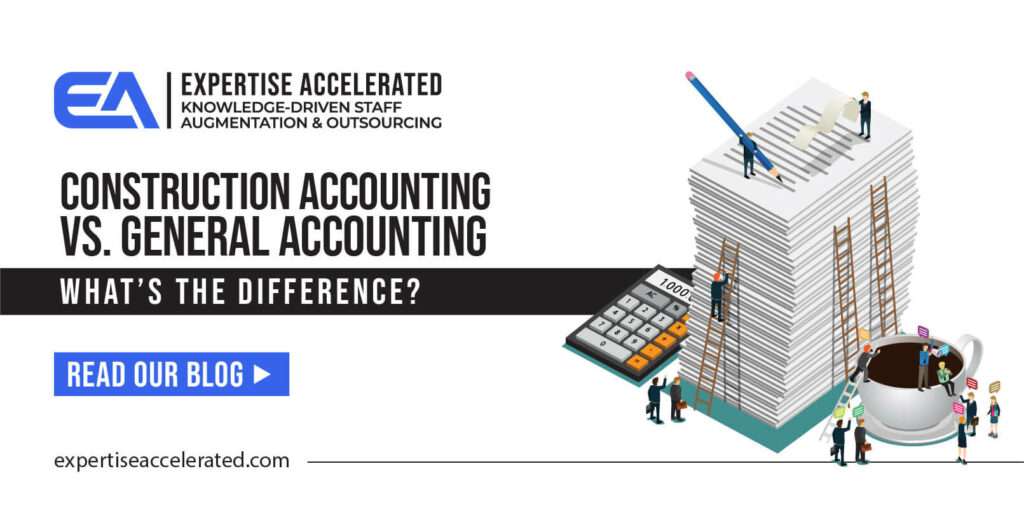Recognizing the Significance of Construction Bookkeeping for Effective Project Management

Duty of Construction Bookkeeping
Construction bookkeeping works as the foundation of monetary monitoring in the construction industry, guaranteeing that jobs are finished within spending plan and economic purposes are fulfilled. construction accounting. This specialized accounting method addresses the distinct difficulties dealt with in building jobs, consisting of differing job periods, changing expenses, and several stakeholders
One of the main functions of building accountancy is to supply precise expense evaluation and tracking throughout the project lifecycle. This facilitates informed decision-making, enabling task supervisors to change timelines and resources effectively. Additionally, building and construction audit boosts capital management by keeping track of accounts payable and receivable, thus making certain that funds are readily available for prompt payments to suppliers and subcontractors.
In addition, building bookkeeping aids in conformity with industry laws and reporting demands. It equips task supervisors with the needed financial information to prepare thorough financial declarations, which are crucial for audits and monetary reviews. By keeping clear records, building and construction accountancy fosters openness and accountability, critical elements in building depend on among stakeholders. Eventually, the role of building accounting prolongs past simple economic tracking; it is important to strategic planning and functional efficiency, driving the success of building and construction projects in a competitive landscape.
Secret Parts of Building And Construction Audit

Budgeting develops a monetary structure that guides project implementation, enabling managers to allot sources efficiently and anticipate prospective financial obstacles. Precise cost monitoring is vital for monitoring expenditures in real-time, assisting to identify differences between predicted and actual prices. This allows prompt modifications to keep the job on budget.
Additionally, financial coverage provides stakeholders with a clear image of the project's economic wellness. Routine records, such as revenue and loss declarations and cash circulation analyses, assist in educated decision-making and improve openness among all celebrations entailed.
Additionally, conformity with industry guidelines and audit requirements is critical. This makes certain that monetary methods are not just effective however additionally lawful, securing the company against legal consequences. By incorporating these key elements, building audit fosters a structured technique to taking care of financial resources, eventually adding to the effective conclusion of construction projects.
Benefits for Job Supervisors
Leveraging efficient building and construction audit techniques gives task supervisors with a plethora of advantages that improve both operational effectiveness and financial oversight. One significant advantage is boosted spending plan monitoring. Precise tracking of revenues and expenditures permits job managers to keep track of financial efficiency in actual time, making sure jobs remain within spending plan and promoting prompt modifications when required.
Furthermore, building and construction audit enhances capital monitoring, making it possible for job supervisors to prepare for monetary requirements and optimize source allotment. By understanding cash money inflows and outflows, they can much better handle settlements to subcontractors, distributors, and workers, therefore preventing pricey delays.
In addition, robust accountancy systems provide thorough reporting capacities. Job supervisors can generate reports that offer understandings into job profitability, expense variances, and resource application. This data-driven method fosters educated decision-making, allowing managers to determine possible issues proactively and execute rehabilitative measures.
Lastly, adherence to building audit standards guarantees conformity with regulatory and legal demands, decreasing the risk of penalties or conflicts. On the whole, effective construction accounting furnishes task supervisors with the tools required to drive project success, enhance stakeholder confidence, and promote long-term organizational growth.
Common Challenges in Construction Accounting
Numerous project managers encounter significant challenges in construction accounting that can hinder project success. Among the key obstacles is the intricacy of tracking several task sites, each with distinct budgets, timelines, and source appropriations. This calls for careful interest to detail, which can be overwhelming without a durable audit system in area.
Furthermore, changing material prices and labor prices can complicate budget monitoring, making exact forecasting difficult. Task supervisors commonly have a hard time to fix up these prices with real expenditures, leading to possible monetary discrepancies.
Moreover, building and construction accountancy involves conformity with different regulations, consisting of tax obligation obligations and labor regulations. Navigating these rules can be daunting, specifically for managers that might not have a strong audit history.
An additional significant obstacle is handling capital, which is critical in the building industry. Delays in invoicing, settlements from clients, or unanticipated project adjustments can create money circulation lacks, threatening the project's progression.
Lastly, efficient interaction between job supervisors, accountants, and area groups is important. Misconceptions can result in unreliable financial reporting, better complicating job go to this website monitoring efforts. Dealing with these obstacles proactively is vital for effective construction bookkeeping.

Ideal Practices for Effective Accounting
While browsing the intricacies of building and construction audit can be daunting, adopting ideal techniques can dramatically boost monetary administration and project success. One fundamental technique is keeping prompt and precise records. Implementing durable accountancy software application tailored to building projects can simplify information entrance, invoicing, and reporting, lowering mistakes and saving time.
Furthermore, establishing a clear budget and normal tracking against this budget plan are vital. Utilizing a system of periodic economic look at these guys evaluations allows task managers to recognize variations early, assisting in timely decision-making. It is additionally vital to separate job costs right into straight and indirect categories, enabling more clear insights right into profitability.
An additional best technique involves cultivating open communication amongst all stakeholders. Regular updates and collective conversations regarding economic status can make certain everyone is straightened and informed. Training team in construction-specific bookkeeping concepts further improves expertise and accuracy.
Finally, ensuring compliance with pertinent accounting requirements and laws is non-negotiable. Regular audits and internal testimonials add to transparency and responsibility, constructing trust with clients and stakeholders. By concentrating on these ideal practices, construction firms can enhance their audit processes, ultimately driving job success and economic security.
Verdict
Finally, construction bookkeeping plays an essential function in making certain effective task management by facilitating accurate financial oversight and improving decision-making. By integrating crucial elements such as expense estimate, cash money circulation monitoring, and conformity, task supervisors can browse typical difficulties and utilize ideal techniques for reliable accountancy. Inevitably, a durable building and construction audit framework not just safeguards budget honesty yet additionally adds to the total economic health and wellness of building jobs, fostering sustainable success within the sector.
By incorporating these essential components, construction accounting fosters an organized strategy to handling financial resources, inevitably adding to the successful completion of building and construction tasks.
Precise tracking of profits and expenses permits job managers to check monetary performance in actual time, making sure projects continue to be within spending plan and helping with navigate to these guys timely changes when necessary.
Job managers can produce records that use insights right into project profitability, price variances, and source usage.Many job managers come across significant obstacles in building audit that can hinder task success. construction accounting. Ultimately, a durable construction accountancy structure not only safeguards spending plan integrity however additionally contributes to the general financial health and wellness of building and construction projects, promoting lasting success within the industry
Comments on “Top Construction Accounting Tips for Ensuring Financial Success in Your Projects”